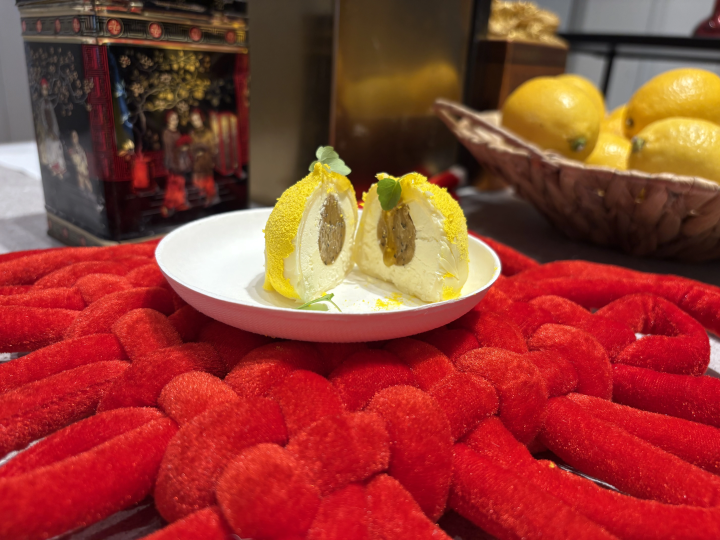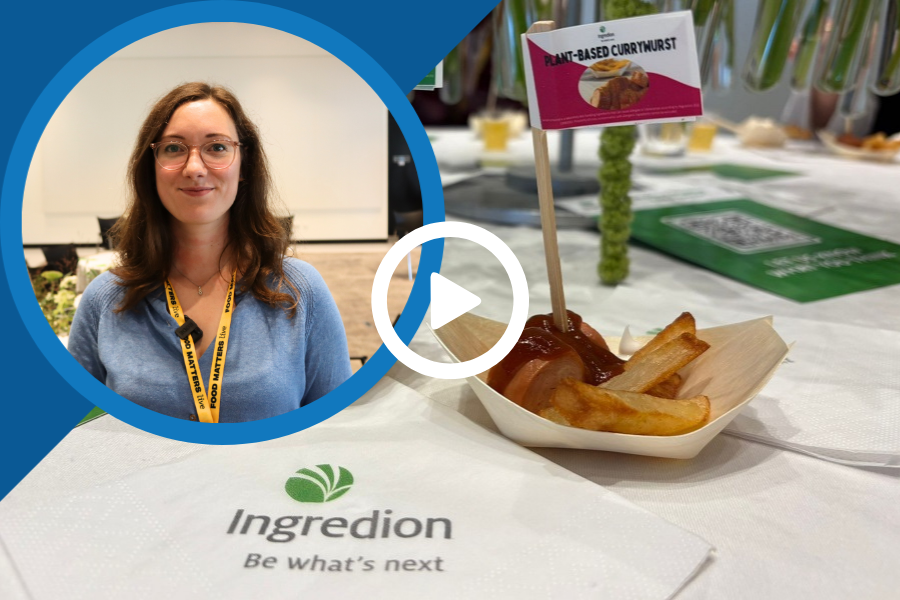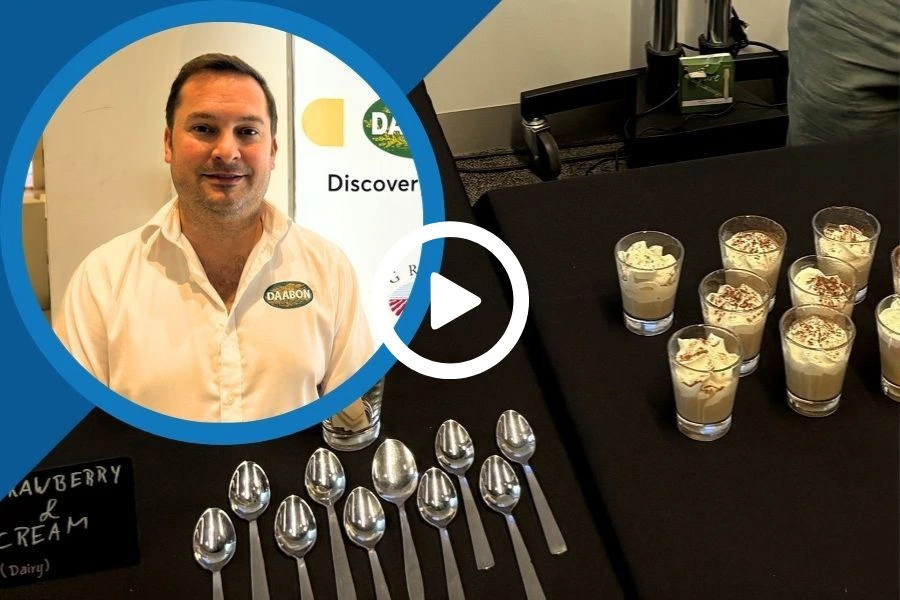
- Industry news
Industry news
- Category news
Category news
- Reports
- Key trends
- Multimedia
- Journal
- Events
- Suppliers
- Home
- Industry news
Industry news
- Category news
Category news
- Reports
- Key trends
- Multimedia
- Events
- Suppliers
Food Matters Live Rotterdam 2025: Luscious mouthfeel, festive flavors, sustainable oils & cost reduction top “Tastes of Better” sessions
Key takeaways
- Agrana Fruit revealed how holidays and limited editions spark consumer excitement.
- Tate & Lyle spotlighted the art of mouthfeel while Ingredion pushed the boundaries of clean label reformulation.
- AAK and Daabon demonstrated how sustainable oils are reshaping the future of food.

Key suppliers showcased the power and panache of their ingredient portfolios during closed-door sessions at Food Matters Live this September 23-24 in Rotterdam, the Netherlands.
During the interactive, sensory presentations, the top themes were limited edition flavors (Agrana Fruit), mastering mouthfeel (Tate & Lyle), a creative, clean label (Ingredion), repositioning palm oil (Daabon), and sustainable fats and oils (AAK).
The sessions took place during Food Matters Live’s “Tastes of Better” program, a series of one-hour ingredient showcases designed for product development, technical, and innovation professionals. Food Ingredients First attended the event and examined some of the highlights from this edition.
Upcoming editions of Food Matters Live will run in Ascot, England (October 8-9) and Dublin, Ireland (November 5) this year. In 2026, events will take place in London (June 3-4) and again in Rotterdam (September 22-23).
Agrana Fruit: Traveling through taste
Austria-based Agrana Fruit took attendees on a journey through time and space to experience seasonally-inspired product concepts. The company highlighted an 11% growth in F&B launches featuring limited edition or seasonal claims from 2023 to 2024. “Festive” and “special occasion” NPD, in particular, led growth at 16% from 2023 to 2024, and Christmas was a strong driver of new product launches.
“Consumers tend to buy the same things when they go to the grocery store, but limited editions add a sense of urgency to the purchase, knowing that it won’t always be available,” explained Melanie Sturm, strategic marketing manager for Agrana Fruit.
Tapping into the data-driven trend, Agrana developed three concepts celebrating the Chinese New Year, the 2026 World Cup, and an Austrian Christmas market.
These occasions have massive consumer bases. The Chinese population alone is around 1.5 billion, and not all of them live in China, noted Suzanne Davies, category manager at Agrana Fruit. That opens the possibilities to create products that aren’t typically consumed in January and February –– when the Chinese New Year occurs –– like festive ice creams.
Agrana presented a yuzu black tea ice cream bite with mochi-white chocolate coating, offering a multitextured experience, combining soft elements of an oozing yuzu and black tea core, surrounded by creamy ice cream, a chewy rice mochi sauce, and a cracking white chocolate, combining four different flavors and textures into one.
 Agrana Fruit developed a Chinese New Year ice cream mochi that fits into the snackable trend and multilayered textures.Consumer data suggest that consumers are exceptionally open to new eating experiences when it comes to limited edition products. Sturm revealed that the percentage of consumers willing to try new, unusual, or exotic flavors for special occasions (76%) is much higher than for everyday F&B (24%).
Agrana Fruit developed a Chinese New Year ice cream mochi that fits into the snackable trend and multilayered textures.Consumer data suggest that consumers are exceptionally open to new eating experiences when it comes to limited edition products. Sturm revealed that the percentage of consumers willing to try new, unusual, or exotic flavors for special occasions (76%) is much higher than for everyday F&B (24%).
The FIFA World Cup also draws huge attention globally, with a viewership of some five billion people, pointed out Katja Ternar, global category and business development manager for foodservice at Agrana Fruit. “We’ve had clients asking about how they can prepare for this global event next year in North America, so we developed some sauces for snacking.”
The company demoed its savory preparations in an avocado dip and a spicy buffalo dip. The avocado incorporated 10% avocado puree into a cottage cheese base, while the buffalo dip was based on tomato and paprika puree with a hint of tabasco.
The applications were prepared in the company’s specialty facility in Konstanz, Germany. This facility is dedicated to savory solutions and can produce tailor-made products that integrate proteins, vegetables, and herbs with sauces into ready-to-use applications.
Lastly, the Austrian Christmas market concept was an apple pie made with a frozen, ready-to-use sliced apple disk that is hand-assembled from apples grown in Poland.
Tate & Lyle: Mastering mouthfeel
This masterclass on mouthfeel explored the multisensory pathways that humans use to experience food, emphasizing how sight, touch, aroma, and even sound have an impact.
Attendees experienced firsthand how the crunchiness of a crisp was heightened while listening to a crunching sound. In another hands-on experiment, they mixed milk into a strawberry concentrate with pectin and witnessed a texture transformation as the combination grew more and more viscous. Calcium in the milk interacted with the pectin, forming networks and a gelling mass.
Speakers from Tate & Lyle showcased how consumer language about food (like “creamy” or “fresh”) can be translated into measurable scientific descriptors, enabling the creation of products that can hit specific sensory targets. In a tasting demonstration, attendees sampled two different types of mayonnaise, one with reduced fat (and added xanthan gum) compared to a full-fat variety. In a blind vote, the reduced-fat version proved more popular, demonstrating how loss of mouthfeel due to reduced oils can be built back with specialized ingredients.
Tate & Lyle also highlighted its top trends in mouthfeel — such as “Mouthfeel Mimicry,” “Next-Gen Naturality,” and “Multi-Layered Textures” — and concepts that demonstrate them.
Building off its newly acquired Nutrava Citrus Fiber from its CP Kelco acquisition, the company demoed a Mocktail Mule that used citrus fiber to round out the mouthfeel of an alcohol-free and low-sugar kombucha-based beverage.
In celebration of multi-layered textures, the company also showcased an “irresistible Dubai chocolate ice cream” featuring a creamy pistachio ice cream base with crunchy pistachios and the crispy snap of katafi pastry.
Ingredion: Clean label
While sensory excitement is high on the agenda, Ingredion’s sessions pointed to the merits of a clean label to win over consumers increasingly looking for natural product messaging. The company’s ATLAS Consumer Research suggested that 74% of European consumers say that “natural” or “all natural ingredients” is an important claim when deciding which F&B products to buy. This number climbs even higher — to 79% — when the sample is expanded to include consumers from the Middle East and Africa. Food Ingredients First spoke with Ingredion’s marketing specialist Annika Reincke from the show floor of Food Matters Live.
Food Ingredients First spoke with Ingredion’s marketing specialist Annika Reincke from the show floor of Food Matters Live.
Taking on the clean label challenge, Ingredion reformulated a host of products into two samples: a conventional and a clean label version. Attendees were able to guess by holding up either pink or green colored cards which product was which.
For example, the company demoed a plant-based currywurst free from methylcellulose, a hydrocolloid that is notoriously difficult to replace. Methylcellulose’s unique functionality comes from its ability to become firm under heat and then soften as it cools, preserving juiciness and bite to plant-based meat analogs. Ingredion presented a clean label version made with a customized recipe that combined plant proteins, fibers, and starches, which would all be recognizable on the label, and had attendees taste them side by side.
Products were also reformulated for cost considerations and supply chain complications, such as its egg-free mayonnaise. Ingredion noted that since 2020, there has been a 51% increase in egg prices in the EU. Cocoa has also faced a crisis in recent years, and addressing this, the company presented a source-of-protein brownie with reduced cocoa that could keep cost-parity with conventional chocolate brownies. Meanwhile, its clean label ketchup was able to achieve a 10% cost reduction in the final recipe.
AAK: Sustainable oils
Edible oils supplier AAK highlighted its strides in sustainability as a key differentiator for its ingredients. The company highlighted its ambitious goal to achieve 100% verified deforestation-free palm oil by 2025, supported by robust traceability systems and satellite monitoring.
“Our last measurement report, which was published at the beginning of 2025, marked progress at 91%, and 100% is expected by the close of the year,” explained Eline Plate, sustainability marketing manager at AAK.
Social impact was another key theme, with initiatives such as the company’s Kolo Nafaso program, which directly sources shea from West Africa, empowering nearly a quarter of a million women. The program helps to improve livelihoods by providing pre-financing, a living wage, bonuses, and training to women. Meanwhile, Farmer programs in Sweden employ regenerative agriculture to reduce emissions and enhance biodiversity in rapeseed cultivation.
Some of the applications presented at Food Matters Live include a chocolate hazelnut spread made with Akospread RS 50 A, a spreadable fat made from locally sourced European rapeseed, which is spreadable at room temperature. The ingredient boasts a lower carbon footprint than both conventional palm oil and RSPO versions.
“By 2026, regenerative innovation will take center stage. It’s not just about reducing impact, it’s about creating positive change. From climate-smart sourcing to circular product design, brands will be looking for ingredients that actively contribute to environmental and social regeneration. Oils and fats will play a key role in this shift, and AAK is already investing in the technologies, partnerships, and practices that will help our customers lead the way,” adds Gabriela Bocchi, Europe marketing manager at AAK.
The company also shared how its Akomarba 127 butter replacer can help reduce the financial and environmental cost of using 100% butter in bakery applications. Lastly, AAK had nutritional beverages on display, fortified with AkoVita OptiSyn, which is a proprietary ratio of omega-3 DHA and phosphatidyl choline. The combination maximizes the effect of DHA by improving its incorporation into cell membranes, where it is needed to be biologically active, flags the company.
Daabon: Rebranding palm oil
Colombian producer of carbon-neutral palm oil Daabon presented its company as a family-run heritage business working hard to reframe palm oil from an ecological foe to a potential climate solution. The company showcased how its plantations and mills can capture carbon, support biodiversity, and contribute to a circular economy by using all of the palm fruit.
 Food Ingredients First spoke to managing director Manuel Davila about how Daabon is repositioning palm oil in Europe as a sustainable ingredient.The company also shared that high-oleic palm oil uses significantly less land than other vegetable oils. As an example, to meet the expected demand by 2050 of 80 million more tons of vegetable oil, the company noted that soybean production would need as much land as five Germanys, whereas the same amount of vegetable oil could be produced with palm planted on an area the size of one Portugal. Using figures like these, Daabon argues that palm oil production and consumption could actually reduce land use.
Food Ingredients First spoke to managing director Manuel Davila about how Daabon is repositioning palm oil in Europe as a sustainable ingredient.The company also shared that high-oleic palm oil uses significantly less land than other vegetable oils. As an example, to meet the expected demand by 2050 of 80 million more tons of vegetable oil, the company noted that soybean production would need as much land as five Germanys, whereas the same amount of vegetable oil could be produced with palm planted on an area the size of one Portugal. Using figures like these, Daabon argues that palm oil production and consumption could actually reduce land use.
The company also shares that its products are easily accessible to European markets based on its geographic location, in comparison to those from Asia. Transit time by sea is 15 days, and a clear shot from the Caribbean to the UK, avoiding the Suez Canal.
Daabon Europe’s managing director, Manuel Davila, said that a turning point for the company occurred in 2019 when Jeff Bezos introduced the climate pledge. At that time, the company made it its mission to become as sustainable as possible. The company currently boasts carbon-neutral palm oil and has amassed numerous certifications, such as RSPO certified, Organic (US, EU, Switzerland, Japan, and China), Regenerative Organic Certified, Fair Trade, and Verified Deforestation Free.
At the “Tastes for Better” event, attendees could sample a wide range of dairy, bakery, confectionery, and fried foods made with palm oils. Some of the unique features include compound chocolate’s long shelf life without the need for tempering. Palm oil’s unmistakable functionality also allows it to create cookie fillings that remain soft in the center after baking without affecting the cookie quality.











